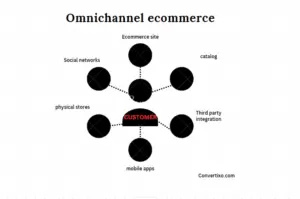What is omnichannel eCommerce? A complete Guide for 2024
Brief overview
In today’s world omni-channel flows through marketplaces. Everybody talks about omnichannel, specifically on omnichannel e-commerce. So what is this? Why is it even important? “and how can you make this work for you?”
In this blog we are gonna dive deep into the concept ofomnichannel itself, its benefits, future trends and most importantly if it’s just a marketing hype or a game-changer!
What is omnichannel e-commerce?

Omnichannel is the new buzzword in the world of ecommerce. It’s everywhere! In simple words it refers to brands trying to create a seamless shopping experience across ALL the platforms you use. and yes, we’re unpredictable creatures with mood swings. We might start researching on our phones, get sidetracked by a meme, and then finally decide to buy those cute boots on our laptops at 2 AM.
Omnichannel, in a chaotic journey of shopping, plays smart. It provides all the necessary information and options you’ve no matter where you’re and what device you’re using. Another plus point is that it personalized your shopping experience based on your past purchase and browsing history.
What are the Benefits of omnichannel e-commerce?
There are numerous benefits of omnichannel e-commerce that also impacts the success of a business. Here are few benefits listed below:
-
- Better customer experience: When a customer shops in-store or online, omnichannel e-Commerce allows them a smooth and shopping experience across all platforms. This may result in increased customer satisfaction.
-
- Increased revenue and sales: You can reach a larger audience and boost sales by giving customers a variety of options for how to shop and engage with your company.
-
- Improved data and insights: Omnichannel e-Commerce enables you to get information from several points of contact, giving you crucial insight about the likes and dislikes of your customers. You can use this information to better satisfy the demands of your clients by using it to inform your decisions and customize your marketing campaigns.
-
- Better stock management: By integrating your stock across all channels, you can lower the possibility of shortages and guarantee that customers can always find what they’re looking for.
-
- Enhanced Efficiency: Omnichannel e-Commerce increases efficiency by streamlining processes. Order fulfilment is made simpler when the same inventory is used for both in-store and online purchases.
-
- Competitive advantage: Providing a smooth shopping experience is crucial for businesses to stay competitive as more embrace omnichannel e-Commerce. You can set yourself apart from the competition and differentiate your brand by embracing omnichannel e-Commerce.
Omnichannel e-Commerce examples-Brands Setting the Bar High
We’ve already discussed the benefits of omnichannel e-commerce. Lets see it in action.
Here are a couple examples listed below:
-
- NIKE
One of the brands that mastered the art of this is none other but Nike. The online and offline stores work together seamlessly for customers. Nike doesn’t show bias when it comes to shopping whether online or in store. The whole vibe is “Shop your way!” So, you can find those perfect kicks online, check if your local store has them in your size with the app, and then try them on before you buy. Plus the app personalised your shopping experience.

-
- STARBUCKS
Starbucks seamlessly integrates its online and offline channels for customers convenience. One of the features of Starbucks is their app, where you can order and pay for your drink in advance. Well this helps customers to stand in line and reducing the wait times. The app doesn’t stop there-it also personalized the customers experience and keep a track of record of it and throws rewards and offers for you! Overall it sets the bar for other brands too!

What is the difference between multichannel and omnichannel e-commerce?
-
- MULTICHANNEL:
It refers to having a business that sells products on various marketplaces like your personal website, Amazon, eBay, social media platforms, and even physical stores.
-
- OMNICHANNEL:
It refers to all the channels working together seamlessly, offering features like, Personalized recommendations, product information, pricing, and promotions across channels. Synchronized shopping carts, allowing customers to add items on one platform and check out on another. Access to order history and purchase details
POSSIBLE Future trends
-
- Use of Virtual Reality: VR is set to transform online shopping by enabling you to virtually “go” through shops, examine products in detail, and possibly try on clothes (virtually, of course) before you buy. Just picture yourself entering a store from the comfort of your couch.
-
- Voice commerce: The growth of IoT(Internet of Things )gadgets and voice commerce is another trend. As smart speakers such as the Amazon Echo and Google Home gain popularity, businesses are looking into methods to include voice shopping into their omnichannel plans. This includes enabling voice ordering for consumers and employing Internet of Things (IoT) devices to track inventory and enhance order fulfilment.
What role mobile apps play in this strategy?

Our mobile phones have become the reflection of ourselves, these days and the mobile apps are the ultimate sidekick in this omnichannel game. Mobile apps have emerged as a powerful tool for brands, providing a personalised and convenient shopping experience for users worldwide. It’s obvious that mobile apps will be essential to the growth of e-Commerce as more and more people shop online. Apps can be integrated with websites, social media, and other platforms to help organisations build a seamless omnichannel experience that caters to customers’ changing needs.
“Creating an app sounds complicated,” but Platforms like Convertixo can help you. They take your website and convert it into a fully functional app(no coding skills needed).
Statistics
The statistics speaks for itself, highlighting how well apps work to increase interaction, sales, and communication among a variety of online audiences.
-
- Usage of Mobile Apps: Research shows that 90% of mobile time is spent using apps, indicating that mobile apps are becoming more and more popular among users. This emphasises how crucial mobile apps are for connecting with and interacting with consumers.
-
- Impact on Sales: Companies that implement omnichannel strategies see an average annual growth in sales of 9.5%, while those that do not experience a rise of 3.4%. This illustrates how omnichannel eCommerce increases sales.
-
- Customer Loyalty: Clients that use several channels have a lifetime value that is 30% more than that of single channel shoppers. This emphasizes how crucial omnichannel marketing techniques are for fostering client loyalty.
-
- Personalization: Brands that provide individualized experiences have greater conversion rates;80% of consumers are more inclined to make a purchase. Through omnichannel strategy, brands may gather and use consumer data for targeted advertising.
Conclusion
In a nutshell, The goal of omnichannel e-commerce is to remove any friction from the customer journey and facilitate a smooth shopping experience regardless of the chosen channel. This strategy is crucial in today’s world, where customers expect a cohesive and convenient experience across all platforms.
FAQ’s
Q) What is omnichannel e-Commerce?
Ans) Omnichannel e-commerce creates a seamless shopping experience across all channels, online, mobile, and even in-store, making your shopping journey smooth and seamless.
Q) How are Multichannel and omnichannel e-commerce different?
Ans) Multichannel offers products across various channels (website, app, store), but the experience might differ on each. Omnichannel connects these channels for a smooth, unified shopping journey, regardless of where you start (phone, laptop, store).
Q) What are the benefits of omnichannel e-commerce business?
Ans) Across all platforms, you have a seamless, customized shopping experience. Companies gain from more satisfied consumers, more revenue, and useful data to enhance their products and services and provide you with suggestions that are pertinent to you. A win-win situation!
Q) Why is omnichannel e-Commerce important for businesses?
Ans) Businesses need omnichannel eCommerce to fulfill the changing expectations of modern consumers, who demand a seamless buying experience across all platforms. Additionally, it increases client loyalty, expands a business’s market reach, and boosts sales.
Q) Which brands have been especially profitable in omnichannel e-Commerce?
Ans) Companies that have succeeded in omnichannel eCommerce include Starbucks, Nike, and Sephora, among others. These companies have effectively combined their online and offline platforms to give their clients a flawless online and offline buying experience.
Read Our more articles here:
The impact of mobile apps on user engagement and retention
